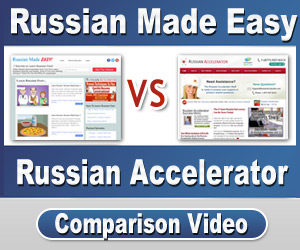How To Say I Need in Russian
Listen To Entire Episode
Exercises Only
Welcome to episode 18. Today’s lessons is in response to an email I got from a listener named Sherri, in Perth, Australia. She writes, “Hi Mark, it’s great how you explained the forms of the word “need” in the course, but it’s still hard for me sometimes to choose the right one. Maybe you could give us more practice in your podcast? Spasibo bolshoe!”
Thanks for writing, Sherri. That’s a common question, which is why I like making these podcasts. They’re a good introduction to Russian for those who are just getting started, but they’re also a great opportunity for me to expand on a lot of the main constructions you learn in Russian Accelerator. Case in point: Practicing with that “I need” construction.
So, we’ll get to that in a minute, but first there are a few new words I’d like us to learn. Repeat this first one. It’s an easy cognate:
сувенир
Again:
сувенир
I realize you know the word is, but listen to this contextual phrase all the same. The little things we buy while on vacation — things like mugs and magnets for the fridge, and of course postcards — are all considered сувениры
So, in English we call them souvenirs, and in Russian they’re: сувениры
Did you hear that Ы sound at the end of the word this time? That’s their plural ending. The equivalent of our “s” in English. Like souvenir versus souvenirs.
Think, for example, about the word for crepes.
блины
It has that Ы ending because it’s plural.. We’re saying pancakeS.
But back to our new word, how would you say:
I want a souvenir.
Я хочу сувенир.
Let’s try one more new word:
машина
It’s kind of a cognate. But let’s get it from context:
The Mercedes S600 is my favorite машина.
But in the U.S., the best selling машина is the Toyota Camry.
So, a машина is a car.
Ask your friend:
Do you like my car?
Тебе нравится моя машина?
And now say:
I want a car.
Я хочу машину.
Obviously we changed that “ah” ending to an “uu” sound. mashinu
Alright…let those sink into the ever growing Russian language center in your brain and we’ll do some review of the last podcast now.
How would you say:
I don’t speak Spanish.
Я не говорю по-испански.
Try saying:
Jessica doesn’t speak Russian.
Джессика не говорит по-русски.
Ask your friend: You speak English?
Ты говоришь по-английски?
Mom doesn’t work.
Мама не работает
She wants to dance.
Она хочет танцевать
My friend Pavel lives in Moscow.
Мой друг Павел живёт в Москве.
Ask your friend Sasha…
Sasha, want coffee?
Саша, хочешь кофе?
How will he answer:
Ok, I will. (As in: Ok, I’ll have some coffee.)
Хорошо, я буду.
So, in that last phrase, хорошо is a way of agreeing. We translate it as “Okay” or “Sure.” But as I said when we first learned it, this very common word has other uses as well. How do you think it would translate in this phrase. My Russian friend tells me…
Марк, ты хорошо говоришь по-русски.
And I tell him:
Спасибо.
So, хорошо also translates as “good” or “well.” As in, You speak Russian well. So tell your Russian friend:
You speak English well.
Ты хорошо говоришь по-английски.
Ok, please repeat the following two word phrase:
мне нужен
And again:
мне нужен
Here it is in context:
Imagine you’re working on your car. You thought you could turn this one bolt with just your fingers, but it’s too tight. So you call out to the friend who’s helping you: “I can’t turn this bolt. Мне нужен that wrench.”
Or, say you’re at a friend’s house and he has Wi-Fi. You’re trying to log in with your iPad, but it’s asking you for the password. So you tell him, “I can’t log on to your Wi-Fi. Мне нужен the password.”
So, мне нужен translates as I need. But literally it means, “To me is needed.” Which makes sense, right? After all, we learned mne nravitsa which literally translates as, “to me is pleasing.”
So try saying, all in Russian, I need a bank.
Мне нужен банк.
How about:
I need a souvenir.
Мне нужен сувенир.
Now let’s learn two more easy cognates that we can use with this construction. Listen and repeat:
компьютер
телефон
One more time:
компьютер
телефон
I bet you understand what those words mean, so let’s jump right to using them. Try saying:
I need a computer.
Мне нужен компьютер.
I need a phone.
Мне нужен телефон.
Now let me stop here for a second. In those phrases we said we needed the following things:
банк, сувенир, компьютер, телефон.
Now, I’ll give you one hundred imaginary rubles if you can tell me what all those words have in common.
The answer? They’re all masculine. That is, they all end with a consonant. And that’s why they all got “мне нужен.”
So, for one thousand imaginary rubles, can you guess how to say:
I need a car.
Hit pause and think about it.
Ok…ready?
I need a car.
Мне нужна машина.
We need the feminine нужна to rhyme with the femine машина.
нужна
Imagine you’re cooking Russian pancakes with caviar…
…but you’re out of caviar. So as you’re racing out of the house, your wife asks you with two words:
Where’re you going? (Literally: You…to where?)
Ты куда?
Tell her:
I need caviar.
Мне нужна икра.
How might you tell your friend:
You need a job. (Literally: To you is needed work.)
Тебе нужна работа.
V.O. And now, here’s your Tip of the Day from Russian Made Easy…
Like today’s lesson, today’s tip is in response to a listener’s email. Matthew Shaw in South Carolina writes, “Hey Mark, thanks for putting together these podcasts. I think I’m ready to get more serious with Russian now, but what do you think…Should I learn to read Russian first, or put that off for a while? That Russian alphabet looks kinda scary to me.”
Hi Matthew. Thanks for writing. That’s a very common question: Do I need to learn to read Russian?
And the answer is, it depends. If all you plan on doing is speaking to people, and having conversations, then no, you don’t need to read. And you can definitely get around Russia or Ukraine on your knowledge of spoken Russian. You can order food, catch taxis, go shopping, and all that. But at some, it really is useful to know how to read Russian. Obviously all signs here are in Russian. But beyond that, learning to read allows you to then write in Russian, too. And to me, that’s the real advantage. Because, as I’ve mentioned, the physical act of writing helps you to learn more deeply.
But you don’t need to learn to read right from the start. After all, think of how long you’d been speaking English as a child, before you ever learned to read. It was many years, actually. That’s why in Russian Accelerator, we make reading optional by writing everything with both Cyrillic — that is, the Russian alphabet — and with English letters, too.
That being said, I do have a course that will teach you to read Russian in just a few days. I’m not kidding. Most members get through the course in about a weekend. And it uses the same very effective technique we’ve been using here to learn words…that is, context. And what’s cool is, the whole way, you’re learning to read real Russian street signs. It’s a really cool course. So if Cyrillic intimidates you, as you said Matthew, please go check it out. It’s called ‘Russian Destroyer’ and it comes free with Russian Accelerator.
Ok, so…back to our new stuff. If you’re feeling tired how would you say:
I need coffee.
Мне нужен кофе.
Ask:
Where is my phone?
Где мой телефон?
Tell your friend:
I like your car.
Мне нравится твоя машина.
Let’s learn one more new cognate. Listen and repeat..
интернет
One more time:
интернет
Imagine you’re in a cafe in Kiev. Tell the waitress:
I need the internet.
Мне нужен интернет.
Is there Wi-Fi?
Есть Wi-Fi?
And here’s our last new word of today’s podcast. It’s not a cognate, so listen carefully and repeat:
квартира
And again…
квартира
Here it is in context. Can you get the meaning?
I’m giving my friend a tour of upper Manhattan. We’re outside a tall building and I point to it, “This is where I used to live. Up on the seventh floor, I had a two bedroom квартира.”
So, квартира is the Russian word for “apartment”…or a flat, I guess, if you’re British.
To me, the word sounds a like the word “quarter” in English. As in, “Someone will show you to your quarters.” Right? your quarters, in English, is your living space. From quarters….we get …kvarteera. It’s pretty close. And I’m not sure, but I bet they’re somehow related. Anyway, try saying:
I need an apartment.
Мне нужна квартира.
Did you remember to use the feminine version, нужна, to rhyme with the feminine квартира? If so, you’re really getting the hang of how Russian works. So let’s try just a few more phrases. Ask your friend…
Is this your apartment?
Это твоя квартира?
Say: No, this isn’t my apartment.
Нет. Это не моя квартира.
Ask your friend:
Is this your computer?
Это твой компьютер?
Say: Yes, it’s mine.
Да, это мой.
Ask your friend if he needs the internet:
Тебе нужен интернет?
Alright. Great job today. I hope you put all these on your flashcards. In the next episode, we’ll learn how to talk about the things we have, and ask other people what they have. I’ll see you then!
DOWNLOADS – (right click with mouse and “save as”)


Please comment or share with one of the buttons below. Your support helps keep the ball rolling!
/span





Leave a Reply